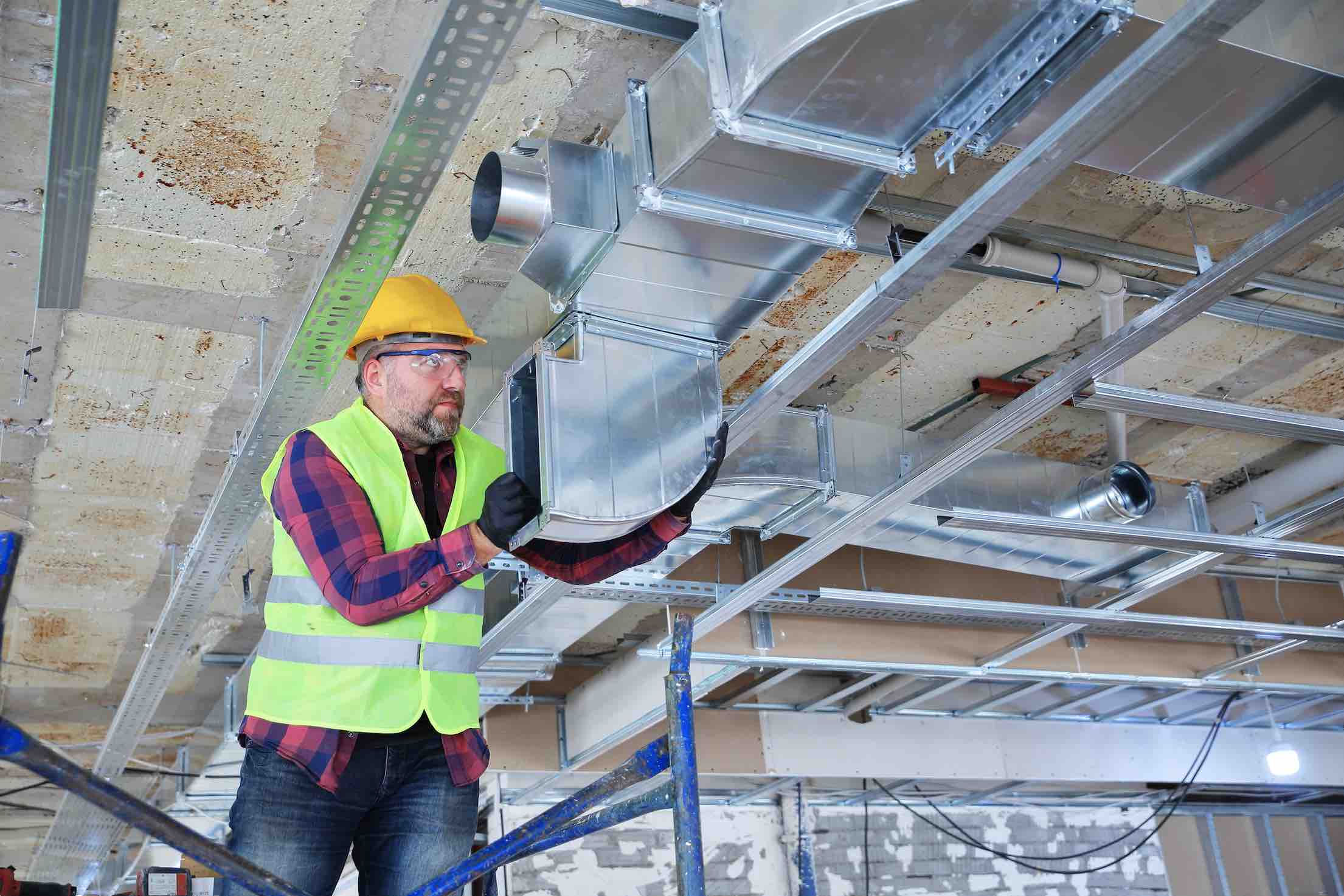HVAC-marktonderzoek

There is a growing demand for HVAC systems, and consumers are looking for the most energy-efficient solutions.
Heating, ventilation, and air conditioning (HVAC) systems are crucial for providing comfortable and healthy indoor environments – and HVAC market research is essential for meeting the customer’s needs and understanding their requirements. Therefore, with HVAC-focused research, businesses can recognize marketplace fluctuations, consumer preferences, discover new market trends, prepare for future strategies, and research the strategies of their closest competitors, among many other benefits.
Why is HVAC market research so important?
The world is experiencing a rise in population, harsher climatic conditions, and general air pollution. These factors, along with a surge in construction and the desire for a comfortable lifestyle, have created a highly fragmented and competitive industry.
Despite the competition, there is ample room for growth.
These factors and many others are making HVAC market research increasingly relevant in the modern world, and are becoming more important for companies. Other factors that make this type of research an effective study are the following:
- HVAC market research enables companies to remain abreast of current trends, including regulatory variations, new technologies, and competitors. This data permits corporations to adjust their techniques and merchandise according to evolving customer requirements in the industry.
- Market research in the HVAC industry allows firms to determine what their customers are looking for in terms of functions, operations, and costs. This data can be utilized to craft products that more accurately satisfy customers’ wants and requirements.
- HVAC market research can assist organizations in recognizing fresh markets to focus on and opportunities to grow the business further.
- Through comprehensive HVAC market research, companies can obtain invaluable insights into how their products are performing and being used. This data is essential for staying ahead of the competition by making improvements to existing systems or creating new ones that meet customer needs.
Benefits of HVAC market research
HVAC market research provides insights into market trends and customer preferences, and it can help companies understand the needs and wants of their target customers.
This information is useful for designing products that better meet customer needs and preferences and developing effective marketing strategies that resonate with the target audience.
Likewise, HVAC market research helps companies build effective marketing strategies. This can include developing customized messaging and identifying the most effective channels for reaching customers.
Aanvullend, conducting research into the HVAC market is an investment that can help a business to:
- Accurately estimate the size of the market available to be served
- Understand consumer pain points, preferences, and buying habits
- Mitigate investment risks
- Identify opportunities in the market
- Identify market and consumer trends
- Identify competitors’ strengths and weaknesses and develop a competitive advantage
- Forecast market growth or decline, and adapt accordingly
- Measure brand awareness and reputation
- Get consumers’ opinions about a new product or service
- Develop the right communication for current and potential customers
- Develop a data-backed market entry and marketing strategy for success
Applications of HVAC market research
There are several applications of HVAC market research that companies can use to improve their products and grow their businesses:
- Through comprehensive HVAC market research, businesses can discover where improvements are needed. By gathering customer feedback as well as industry insight from experts, companies can create products that perfectly align with what their customers want and need. This allows them to stay one step ahead of the competition while providing superior service compared to other brands on the market.
- Companies can create successful marketing and advertising approaches by learning about consumer preferences, buying behavior, and the best methods to reach them. Designing consistent messages that appeal to customers is key to ensuring the effectiveness of marketing campaigns.
- With HVAC market research, businesses can gain valuable insights into consumer behavior and the direction of the industry. This data can be used to accurately forecast sales volume and calculate production levels for optimized efficiency.
- Companies that leverage HVAC market research can remain competitive and stay ahead of the curve. By evaluating their rivals, businesses can leverage this data to pinpoint opportunities for development in design, marketing, and sales tactics. With a comprehensive understanding of the current trends in the industry comes an invaluable edge on products and strategies.
- Through HVAC market research, companies can effectively gauge their customer satisfaction levels and locate areas of improvement in service and support. By gathering customer feedback, addressing customer complaints, and incorporating changes to better serve customers, organizations can increase loyalty and maintain retention rates.
Opportunities in the HVAC Market
At a global level, the HVAC industry is thriving in four different markets. Although these markets share many similarities, key factors open up some markets more than others.
1. U.S. HVAC Market
The U.S. market is poised for growth due to requirements to improve Indoor Air Quality (IAQ). The ventilation fans category will see increased interest, especially for maintenance services, due to the need for fresh air in hotels, shopping malls, and airports.
There is also a focus on building “green” buildings, which leads to a higher demand for HVAC systems and maintenance services.
2. Europe HVAC Market
Europe’s HVAC industry is growing due to rapid urbanization, an increase in disposable income, government regulations, and increased spending in sustainable construction.
Europe stands out for its push to reduce CO2 emissions. This has led to economies like Germany and Finland to promote the use of new technologies in the construction and HVAC industries.
3. U.A.E. HVAC Market
There is a lot of construction in the U.A.E.’s commercial and residential sectors. While this results in an increased demand for HVAC solutions, the country’s desert climate is the biggest factor contributing to the industry’s growth.
Consumer trends such as automatic temperature regulation, monitoring of humidity levels, alerts for servicing, and system access through mobile devices, are creating more avenues for businesses to increase their revenues.
4. APAC HVAC Market
As multinationals set up in the APAC region, they’re driving up the demand for real estate space. With a construction boom in China, Japan and India, and an increase in average temperatures in the region, the demand for AC systems is set to go up.
As India boosts its manufacturing capacity, local players are ramping up production, even as the country experiences an inflow of FDI.
Challenges Facing the HVAC Industry
With all the opportunities available for HVAC businesses, some challenges could stand in the way of growth.
1. Seasonality
The HVAC industry is seasonal. While summer brings a high demand for AC units, winter drives the sale of heating solutions. Providers of maintenance services experience similar fluctuations since the number of customer calls varies with the seasons. This makes business growth a significant challenge, especially for the smaller players.
2. Increased Competition
The industry’s growth is attracting new players and the competition is becoming stiff. Service providers are the worst affected since most of them rely on brand loyalty for growth. Whereas some businesses are getting stuck with low prices, others are differentiating themselves by providing exceptional customer experience.
3. Talent Shortage
Baby boomers are retiring and creating job opportunities. The younger workforce is however reluctant to fill those positions, resulting to questions about the industry’s future. The talent crunch has also led to a lack of innovation in the HVAC industry, with players settling for improvements to current systems rather than disruptive solutions.
Trends in the HVAC Industry
Major challenges aside, the HVAC industry is witnessing change.
1. Mergers & Acquisitions in the HVAC Industry
Many Lower-Middle-Market (LMM) companies are struggling and more profitable ones are buying them out to expand their customer base and increase market share. Some big players are also joining forces to establish a more significant dominance in the market and to increase profitability.
2. Smart HVAC Systems
Convenience and the cost of energy are driving the uptake of smart systems. Top “smart” solutions being incorporated into HVAC systems include:
- Learning thermostats
- Voice-controlled systems
- Motion-activated ACs
- Remote temperature adjustment
- Use of sensors to monitor system performance
- Alerts for systems maintenance and automatically submitting work orders
- System access and control through mobile apps
3. Improving Indoor Air Quality Using UV Light
To solve problems with poor IAQ, manufacturers are fitting UV Germicidal light into their systems. While some HVAC manufacturers are providing this as an additional service, there are DIY solutions available from UV-C light bulb manufacturers.
4. Focus on Customer Experience
HVAC consumers now have high expectations, and these are influencing their purchase decisions. Businesses are adapting by embracing CRM systems and analytics to understand and cater to consumer needs.
Businesses are also increasingly undertaking market research to gain insight into consumer preferences and make better business decisions.
Future outlook of HVAC market research
Innovation is the key factor behind booming growth in the HVAC market research industry. Smart thermostats, energy-efficient heating and cooling systems, and air purifiers are revolutionizing this sector with their cost savings, efficiency gains, and upgraded comfort levels. To meet customer demand for eco-friendly alternatives to traditional products, companies are funneling immense investments into R&D for advanced HVAC components that make a difference.
Moreover, HVAC market research is rapidly advancing with the widespread adoption of digital technologies such as cloud computing and big data analytics. By leveraging these tools, businesses can collect and analyze extensive amounts of data, enabling them to maximize efficiency while reducing energy costs. Additionally, combining HVAC systems with IoT-enabled smart home devices will provide an improved user experience that is both intuitive and seamless.
Finally, evolving regulatory policies and environmental issues are a big concern for future developments in this industry. Governments worldwide have implemented stringent regulations and standards to encourage the installation of energy-efficient systems and reduce greenhouse gas emissions.
HVAC Market Research Solutions
SIS International’s research solutions for the HVAC market can include:
|
“Voice of the Customer” Surveys |
Understand why customers choose you or your competitors |
|
Concurrentieonderzoek |
Know your competitors’ strengths/weaknesses and understand their USP |
|
Competitor Intelligence Tracking |
Track and report competitor marketing to understand their strategy |
|
Telephone or Face to Face Interviews with Dealers |
Understand the challenges your dealers face and help them sell more |
|
Brand Tracking |
Measure and track the awareness and perceptions of your brand and those of your competitors |
About HVAC Market Research
At SIS, we conduct market research for clients with needs ranging from market entry to market dominance. Although our market research solutions are based on qualitative and quantitative methodologies, we have fine-tuned our processes for efficiency and accurate data collection and analysis.
Through our industry experts across the globe, we tap into our networks and maximize research tools to ensure we deliver market insights that are helpful and actionable.
SIS International biedt kwantitatief, kwalitatief en strategisch onderzoek. Wij leveren data, tools, strategieën, rapporten en inzichten voor besluitvorming. Wij voeren interviews, enquêtes, focusgroepen en vele andere marktonderzoeksmethoden en -benaderingen uit. Neem contact met ons op voor uw volgende marktonderzoeksproject.



